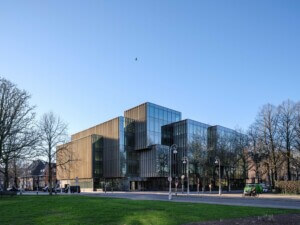At the 2016 Oslo Architecture Triennale, Rotterdam-based firm OMA and Oslo-based interaction designers Bengler debuted PANDA, a startup that addresses the social and political implications of digital sharing platforms such as Uber and Airbnb, as well as their impact on the built environment.
They explain that while Silicon Valley optimism sells itself as democratic and empowering—an alternative to centralized commercial and social structures—they are actually detrimental to the working classes that support these networks with their labor. The Silicon Valley approach fragments and atomizes the labor force by leveraging workers’ private property while keeping them in a constant state of freelance contract work.
For example, while Uber sells itself to drivers by offering them the opportunity to “own the moment,” featuring a model in a suit getting out of a luxury car. However, we all know that this is not the reality for most drivers. Uber has a clause in their terms of use that states that drivers can only resolve disputes with the company as “individuals.” As a result of maneuvers like this, many workers have almost no power to negotiate or bargain with the “new Rome,” located somewhere near San Francisco.
PANDA would locate and organize people into groups that have shared interests and resources to organize counteractions against these empires of Silicon Valley, or “algocrats,” as the creators, OMA’s Ippolito Pestellini Laparelli and Bengler’s Even Westwang and Simen Svale Skogsrud, explained.
For example, Airbnb is trying to get into China. PANDA would identify people with “shared leverage” like potential drivers. Then, these people may be able to organize and effectively challenge them to get better conditions. Or, perhaps these groups could pool their money to buy a lawyer. PANDA creates webs of temporary alignment where discontent and leverage turn into action potential. For architecture, “Unrest is staged against app-based, short-term accommodation platforms and the conversion of entire buildings into de facto hotels,” they explained.
PANDA is a for-profit corporation and the owners claim that as it grows, it will become more powerful but will not overextend itself. By linking like-minded people together, the app would actively use the framework of sharing technology against itself. PANDA’s language emerges from combining activism with the hyper-domestic offices of Airbnb, etc., as well as brainstorming culture and personal performance metrics.










